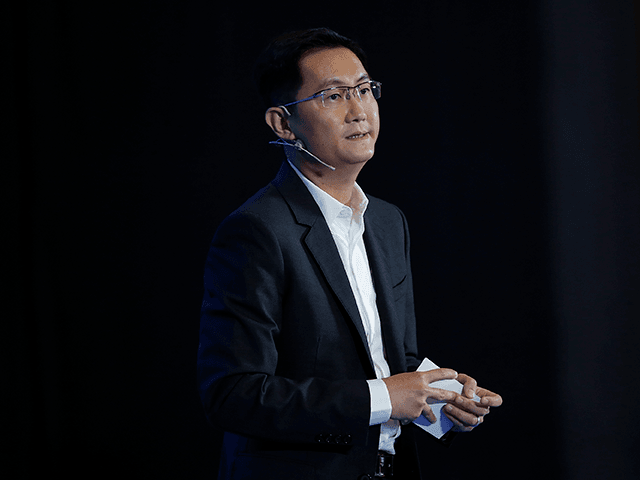The Chinese Communist Party (CCP), having humbled billionaire Jack Ma and cut his Alibaba e-commerce empire down to size with anti-trust regulations, turned its attention to another tech billionaire and his corporation, Pony Ma and the social media/videogame titan Tencent Holdings.
Pony Ma was reportedly called in for an unpublicized meeting with antitrust officials Thursday.
“The meeting is the most concrete indication yet that China’s unprecedented antitrust crackdown, which started late last year with billionaire Jack Ma’s Alibaba business empire, could soon target other internet behemoths,” Reuters observed.
Tencent reported a 175-percent increase in quarterly profits on Wednesday, driven by surging videogame revenues. Pony Ma said at the time he was working closely with regulators and “reviewing some conditions in our past investments.”
Tencent described his chat with regulators on Thursday as “voluntary” and “one of the regular meetings that we have,” covering “a broad range of topics.”
“The main focus is actually on creating a healthy environment for innovation to happen in China,” said Tencent President Martin Lau Chi-ping.
Some of Reuters’ sources said Ma went out of his way to let the Chinese Communist Party (CCP) know he was ready to play ball, requesting a meeting with China’s all-powerful State Administration of Market Regulation (SAMR) during the convention of China’s rubber-stamp legislature, the National People’s Congress, a few weeks ago. Thursday’s talk between Ma and SAMR would apparently have been his first personal conversation with the regulatory body.
Outside observers suspect Pony Ma carefully studied the fate of Jack Ma (no relation), the flamboyant entrepreneur who was China’s richest man before he publicly criticized the CCP’s hidebound regulators in October. Jack Ma vanished for a while, and when he resurfaced he was China’s fourth–richest man, having lost about $12 billion in net worth – and the opportunity to hold the biggest IPO in world history for his financial corporation, the Ant Group.
Pony Ma, in contrast, has been keeping a low profile and sending every possible signal that he has no intention of challenging Communist leadership or becoming a larger-than-life figure whose personal following could rival that of dictator Xi Jinping. Ma is currently the second-richest man in China, with a net worth of about $74 billion, but rarely makes any effort to capture the public eye.
Tencent reported revenues of $20.3 billion for the past quarter, a 26 percent increase from the previous year, with online gaming revenue up 29 percent to reach $6 billion. Tencent is by far the largest videogame corporation in the world, even though few American players recognize the name. Over the past few years it has purchased a stake in everything from the hugely popular online shooter “Fortnite” to the “Assassin’s Creed” and “Call of Duty” franchises, online game store Epic Games, and a slew of top mobile gaming companies.
Tencent is an even bigger force in the huge Chinese game market, effectively serving as the gateway through which most videogame entertainment passes. Tencent is also a major force in Hollywood, financing big movies such as the latest installments of the “Men in Black” and “Terminator” franchises, and it virtually cornered the market on Internet chat in China with its messaging application WeChat.
Reuters’ sources said Tencent has reason to worry about SAMR’s crackdown on Chinese Big Tech business practices seen as unfair or anti-competitive. Regulators might also decide Tencent is simply too large and work on chipping it down to size. The company has scaled back some planned acquisitions due to apprehensions about an anti-trust investigation. In mid-March, it paid a significant fine for failing to properly report proposed mergers to SAMR.
Despite its announcement of huge revenue growth, Tencent’s stock value slipped on Wednesday, apparently driven by concerns about what Chinese regulators plan to do with the company.
“As one of China’s big two, it’s perfectly normal that Tencent felt anxiety about being targeted. There are two worries for Tencent, a concentration of undertakings review could impact acquisition deals, while investigations and litigations on abuse of dominant market positions could hurt the advantage of its platforms,” Shanghai lawyer You Yunting told Reuters.
Tencent was dragged into the CCP’s sudden and ferocious pushback against allegations of slave labor in Xinjiang province on Thursday, removing two character skins designed by British fashion house Burberry from “Honor of Kings” – an online game with almost 100 million players in China – because Burberry refuses to buy cotton from Xinjiang. The CCP is seeking to punish all foreign companies that dared to criticize its use of forced labor by Uyghur Muslims.

COMMENTS
Please let us know if you're having issues with commenting.